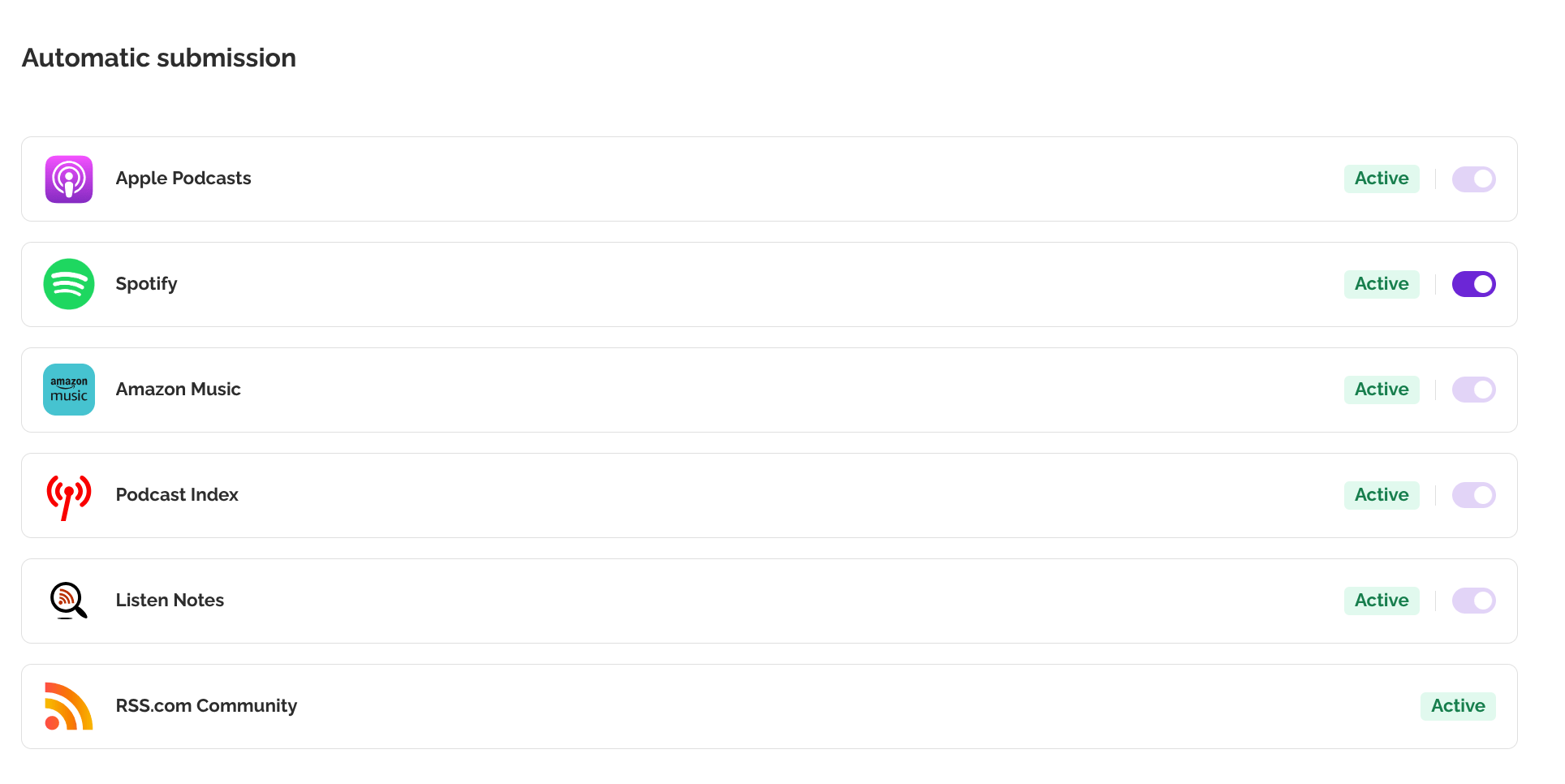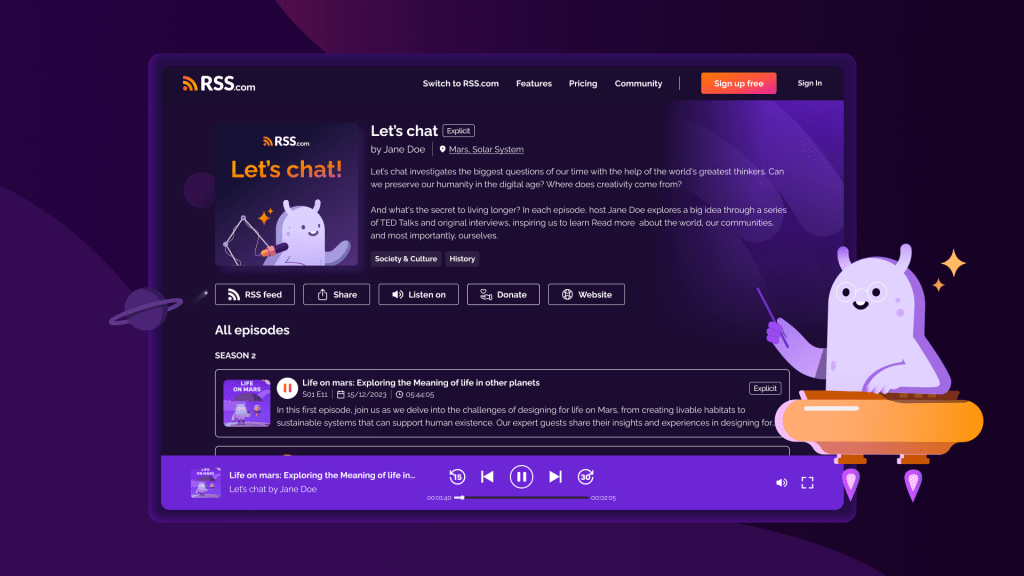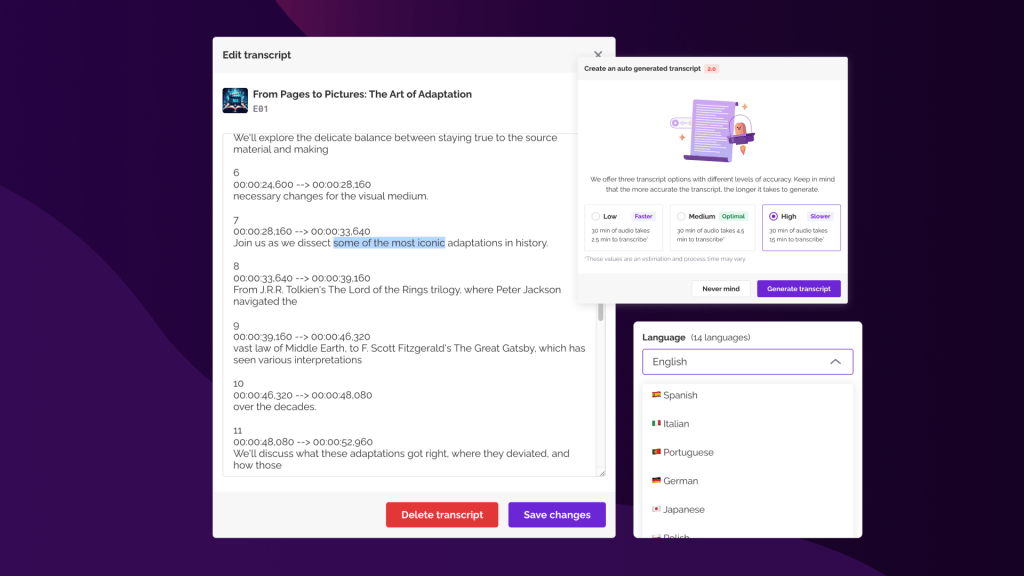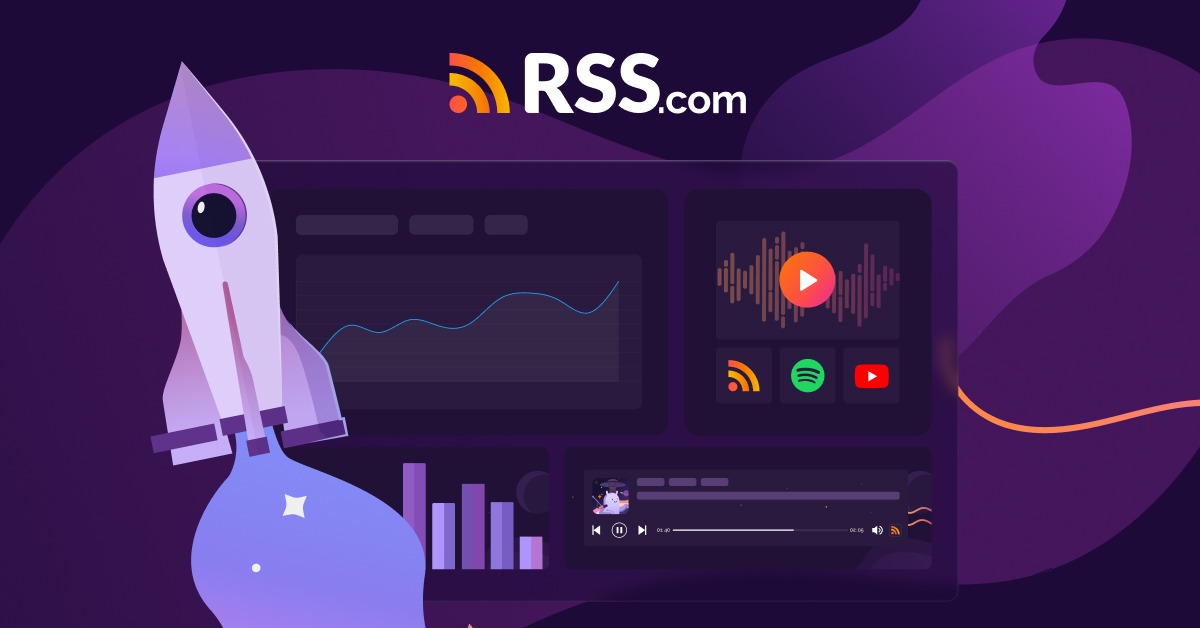If you’ve ever felt like your podcast is a tree falling in the woods with no one around to hear it, you’re not alone.
Many podcasters struggle with discoverability, wondering why their show isn’t attracting listeners.
The good news? Around 40% of podcast discovery happens through podcast listening apps like YouTube, Spotify and Apple Podcasts, which means that optimizing your podcast for search can significantly boost your audience.
In this post, we’ll cover everything you need to know about making your podcast more searchable – from optimizing your podcast name to crafting compelling episode titles and descriptions.
Ready? Let’s dive in!
1. Choosing the Right Podcast Name
Your podcast’s name is its first SEO signal.
It needs to be clear, specific, and searchable.
Clever names can be fun, but if they don’t tell people what your show is about and could be hurting your discoverability.
Ask yourself:
- What problem does my podcast solve?
- What is the unique value proposition of my podcast?
- Who is my target audience?
The more specific you can get with your podcast name, the better.
Your podcast’s name should clearly communicate its unique value proposition (UVP) to listeners and include terms they’re likely to search for when looking for a show like yours.
When you niche down, your listeners will feel as though you’re talking directly to them.
Show names that are specific can result in more visibility and downloads. For example: Cooking Feasts for Big Families, Freelance Writing for Beginners, or Debt-Free Living on a Teacher’s Salary – these are super clear, and anyone who sees them knows exactly what they’ll be getting.
✅ Good: “Cooking Feasts for Big Families” – Clear audience and topic.
✅ Freelance Writing for Beginners – Uses exact search-friendly keywords.
❌ Not Great: “The Hustle Pod” – Too vague.
2. Crafting a Compelling Podcast Description
Your description helps both listeners and search engines understand your show. The first two lines are crucial because that’s what potential listeners see when searching. Focus on:
- Clearly defining what your podcast is about.
- Identifying who it’s for.
- Highlighting the value it provides.
Important note: Different podcast platforms treat descriptions differently.
For example, Apple Podcasts does NOT consider your podcast description for search ranking. They only pay attention to your title and author matter there.
However, Spotify, Amazon Music, YouTube Music, and other platforms DO use descriptions for ranking.
This means you should optimize your description for the majority of platforms while ensuring your title and author fields are perfectly optimized for Apple.
✨ Example of a Strong Podcast Description:
“Want to start freelance writing but don’t know where to begin? Freelance Writing for Beginners helps you land your first client, improve your writing, and build a steady income – all from home.”
This description answers key questions, includes search-friendly keywords, and encourages engagement.
3. How to Optimize Your Podcast’s Episode Titles:
Episode titles matter – a lot.
In fact, 80% of listeners decide whether to tune in based on the title alone.
The right title can make or break your episode’s success.
When naming your podcast episode, make sure the title is specific, descriptive, and includes relevant keywords that your audience is likely to search for.
A clear, keyword-rich title helps your episode rank higher in search results and ensures it reaches the right listeners.
Since you have limited places to put SEO keywords (title, author, description, episode titles, episode descriptions), each title is valuable real estate.
Be sure to reflect the topic or main takeaway of the episode in the title, so listeners know exactly what to expect.
Best Practices for Episode Titles:
✅ Be specific and descriptive – Use keywords that reflect what listeners are searching for.
✅ Avoid clickbait – Deliver on the promise in your title.
✅ Create curiosity – Engage potential listeners with thought-provoking phrasing.
✅ Experiment strategically – Try 2-3 different keyword approaches and monitor both ranking AND download performance after 2-3 weeks.
✨ Examples of Good Episode Titles:
✅ How to Write Catchy Headlines for Blogs – Clearly states the benefit.
✅ Maximizing Your Podcast Reach on Social Media – Highlights a specific problem and solution.
❌ Episode 14: A Chat with Jane Doe – Lacks clarity and doesn’t inform listeners about the content.
4. Writing Effective Episode Descriptions
Just like your podcast description, the first two lines of your episode description are prime real estate. Your goal is to hook potential listeners immediately.
What to Include:
- A question or curiosity statement – Draws listeners in.
- A quick summary – Tells them what to expect.
- Relevant keywords – Naturally integrated for searchability.
- A call to action – Encourages subscriptions, follows, or website visits.
✨ Example of a Strong Episode Description:
“Struggling to write a compelling headline? In this episode, we share five easy techniques to craft headlines that grab attention and get clicks. Whether you’re blogging, podcasting, or posting on social media, these tips will help your content stand out.”
This description immediately hooks the reader, provides a clear value proposition, and integrates keywords seamlessly.
5. Hidden SEO Levers to Boost Discoverability
Beyond the core optimizations, there are a few lesser-known tweaks that can improve your podcast’s searchability:
Choosing the Right Category
Selecting the right category can help your podcast rank higher in niche searches. If your podcast covers personal finance, don’t just use “Business”—opt for more specific subcategories like “Investing” or “Careers.”
Leveraging Metadata
This is the most underused strategy!
Your podcast’s author field can include more than just your name. Add relevant keywords like your expertise or niche.
Podcast search engines favor both “by-title” AND “by-author” matches equally, yet most podcasters only put their name here.
Here are some examples of advanced author optimization:
- Add your expertise: “Joe Casabona, Podcast Coach & RSS.com Evangelist”
- For maximum SEO benefit, put keywords first: “Podcast Coach & RSS.com Evangelist, Joe Casabona”
- Make it specific to your niche: “Baseball Training Expert, Greg Wasserman”
This strategy works because platforms prioritize keywords that appear at the beginning of metadata fields.
Adding a Tagline to Your Podcast Name
A descriptive tagline can add clarity and boost searchability.
Example: “Freelance Writing for Beginners: Tips to Become a Writer People Want to Hire.”
Platform-Specific Optimization Strategy
Remember that what works on Apple Podcasts doesn’t necessarily work on Spotify or YouTube Music.
Consider your audience demographics and where they’re most likely to discover your show, then prioritize optimization for those platforms accordingly.

6. Submit Your Podcast to Directories
When you submit your podcast to the largest directories like Apple Podcasts, Spotify and Amazon Music, your podcast is accessible to millions of new listeners.
Getting listed in these directories increases your chances of being found and can help boost your visibility in Google search results.
🚨 Critical Warning 🚨
Never submit your podcast to the same directory twice. Duplicate submissions (like having two different Apple Podcast IDs for the same show) split your reviews, downloads, and SEO authority. This significantly hurts your search rankings because platforms consider download numbers when determining which podcasts to surface first.
You can check out this list of the most popular podcast directories to help you get started.
By the way, if you host your podcast with RSS.com, you can take advantage of our automatic and guided distribution to the most popular listening apps – we make it easy!

Watch the video below for a step-by-step walkthrough on how to get your podcast on Spotify, Apple Podcasts, YouTube and more!
7. Create a Website for Your Podcast
Having a dedicated website for your show gives search engines like Google more content to index, making your podcast easier to find when people search for it.
Each episode should have its own blog post, complete with an SEO optimized title, a well-written description, an embedded podcast player, and a transcript (more on that next).
Your website is also a great place to build an email list and keep your audience up-to-date.
If you host your podcast with RSS.com, we provide a fully optimized website for your podcast that’s customizable and that updates automatically when you upload new episodes.

8. Include Transcripts on your Website
What Are Podcast Transcripts?
Podcast transcripts are written versions of your audio content. They provide a text-based representation of everything spoken in an episode, making it easier for search engines to index and for listeners to reference.
Why Are Transcripts Important?
Transcripts play a crucial role in improving your podcast’s discoverability and accessibility. Search engines cannot directly index audio content, but they can read text.
By providing a transcript for each episode, you:
- Boost SEO – More keywords and content mean better search rankings.
- Improve accessibility – Allows hearing-impaired individuals to engage with your content.
- Enhance user experience – Some listeners prefer to skim content before deciding to tune in.
- Repurpose content – Easily convert transcripts into blog posts, social media content, or email newsletters.
To maximize the benefits, ensure your transcripts are well-formatted and include timestamps, speaker labels, and relevant keywords.
Your episode transcripts will often automatically include your keywords and topics, so that can immediately help search engines discover your content.
Not only that, but transcripts are a great way to give you more depth within your content; some people do better by reading than listening, and many people like to go back and find information again.
RSS.com offers AI-powered transcripts with every plan, making it easy to generate and use transcripts to boost your show.

✨ Learn how to to transcribe your podcast for free.
9. Ask for Reviews
Positive reviews and high ratings will allow you to rank higher in Google search.
Reviews and downloads work together for SEO
Podcasts with more downloads naturally rank higher than identical shows with fewer downloads. Reviews help drive more downloads, creating a positive SEO cycle.
You can hope your die-hard fans will think of reviewing you all on their own, or you can take matters into your own hands. ASK for reviews!
Where to Ask for Reviews:
- Apple Podcasts – The biggest player in the podcast industry. Reviews here heavily influence rankings.
- Spotify – While it doesn’t allow written reviews, users can leave star ratings.
- Podchaser – Known as the “IMDb of podcasts,” it allows users to leave reviews for shows and individual episodes.
- Podcast Addict – A popular app for Android users that supports ratings and reviews.
- Goodpods – A social podcasting app where users can rate and recommend episodes.
Don’t overwhelm your listeners with the ask, but tell them that if they’re enjoying your content, you’d appreciate a review. You can ask for reviews at the end of an episode, in your show notes, or through email newsletters.
Consider offering an incentive, like a shoutout or entry into a giveaway, to encourage more participation.
Mastering Podcast SEO: Grow Your Audience with Search
We recently held a YouTube Live event on mastering podcast SEO where we discussed actionable tips on how you can get your show get found, ranked, and recommended on Google and listening platforms like Apple Podcasts and Spotify.
If you missed it, you can watch it here:

Bonus Tip: Use Social Media to Grow
Don’t forget the power of social media in discoverability – this includes YouTube.
Did you know that search engines take your posts — and people’s interactions on them — into account when ranking your website?
Active social media accounts that link to your podcast content can help improve your SEO.
Beyond SEO, when listeners share an episode, you’re getting exposure to their audience helping you expand your reach.
Social helps amplify and increase awareness for your podcast and episodes.
How to Promote Your Podcast on Social Media:
- Create audiograms – Share engaging audio snippets with captions using tools like Headliner or Wavve.
- Post on Instagram Reels, TikTok, and YouTube Shorts – Short-form videos attract engagement.
- Use Twitter and LinkedIn – Share episode insights and encourage discussions.
- Engage in Facebook Groups – Find relevant communities and contribute value.
For more tips on utilizing social media to grow your podcast’s listener base, check out the video below!
Final Thoughts
If you want to grow your podcast audience, start by optimizing your podcast name, description, episode titles, and episode descriptions. These foundational changes can make a massive difference in how easily people find and engage with your content.
SEO Timeline Expectations: Unlike traditional web SEO, podcast SEO has limited metadata fields to optimize. Be patient with results. Platforms need time to ingest changes, and you should wait at least 2-3 weeks to evaluate whether your keyword experiments are working. Monitor both ranking improvements AND actual download increases to determine success.
Don’t forget your back catalog: Optimizing older episodes is valuable experimental ground since current subscribers have already heard them, but new potential listeners haven’t.
Ready to take it further? Experiment with categories, metadata, and external platforms to maximize your reach. Have you tried renaming your podcast for better discoverability?







